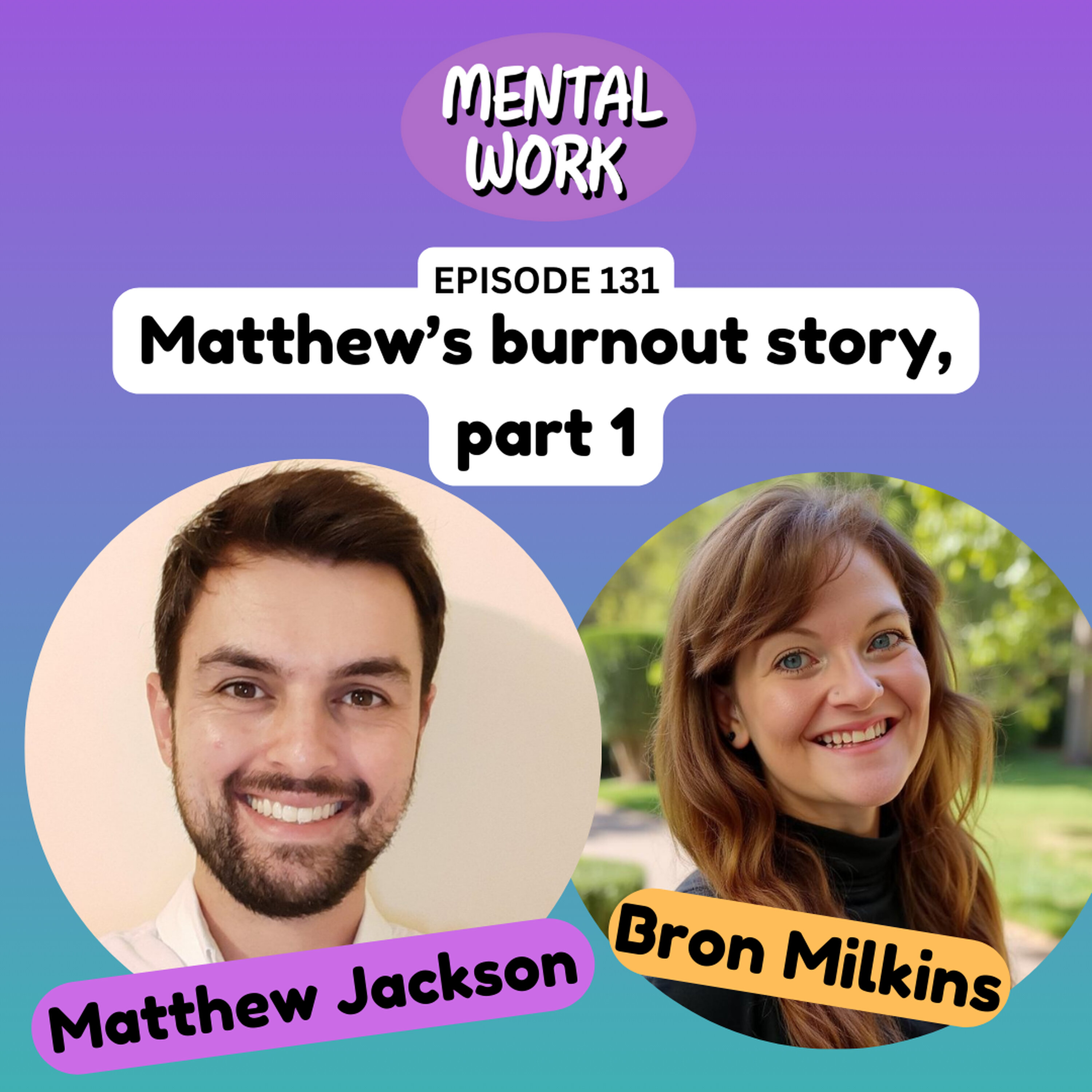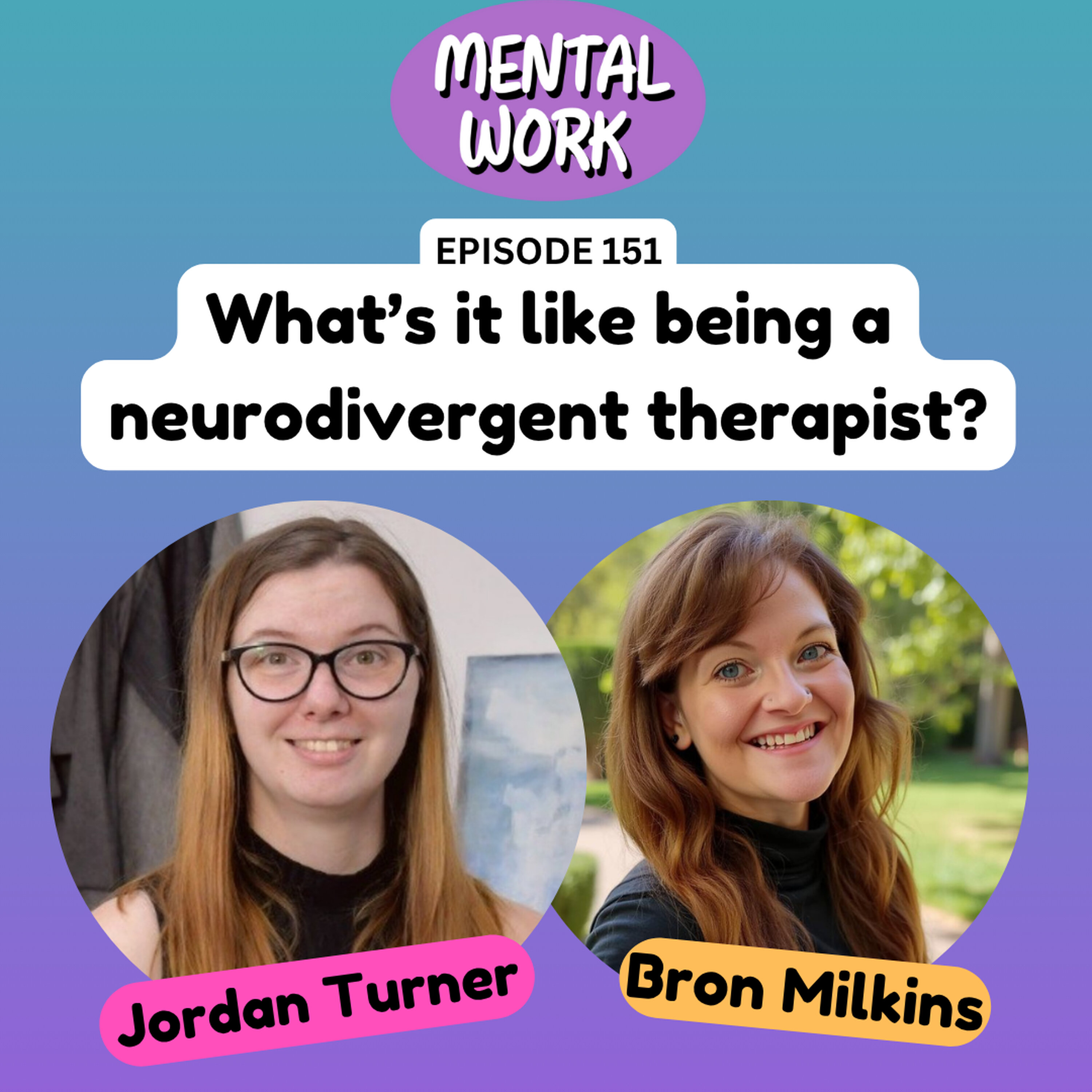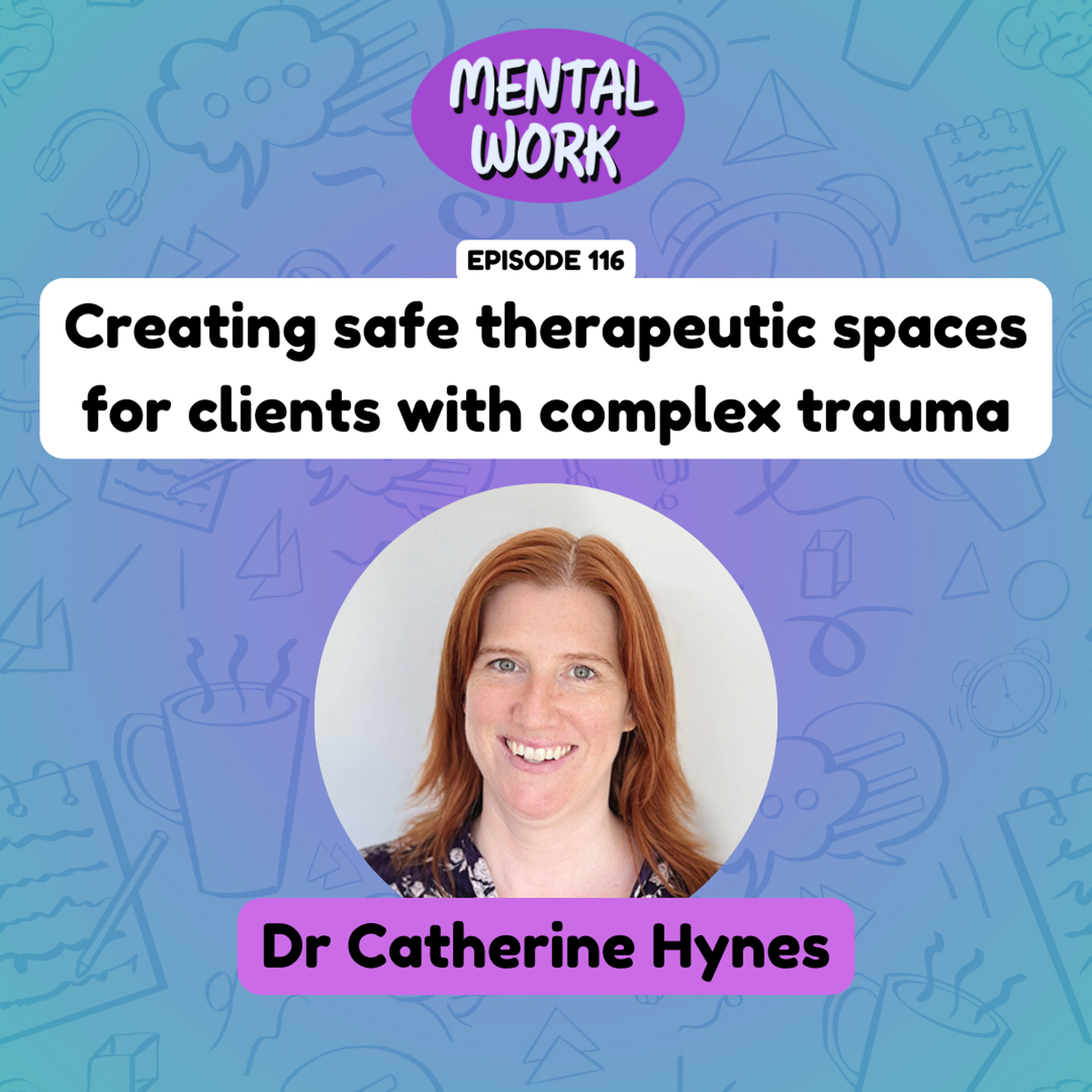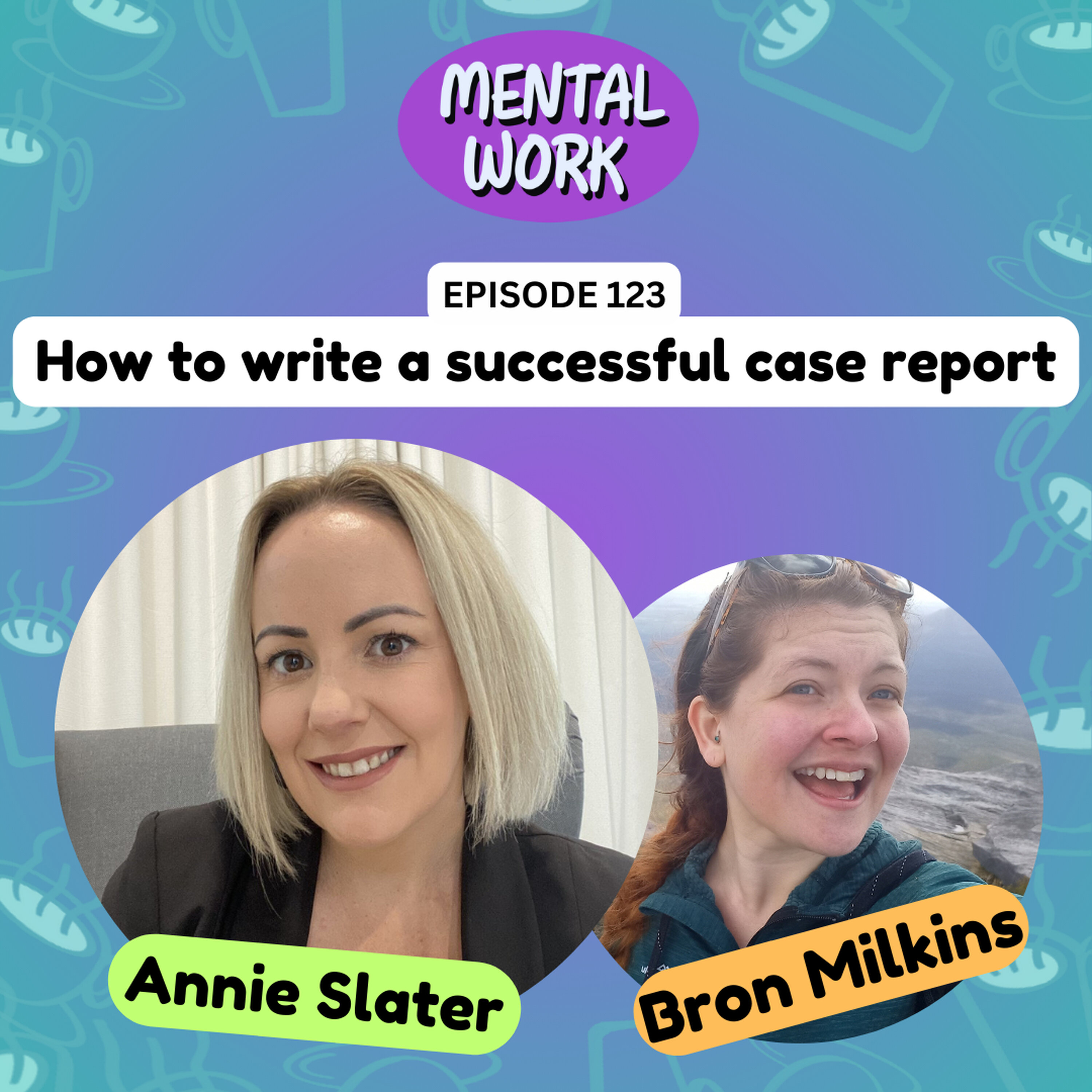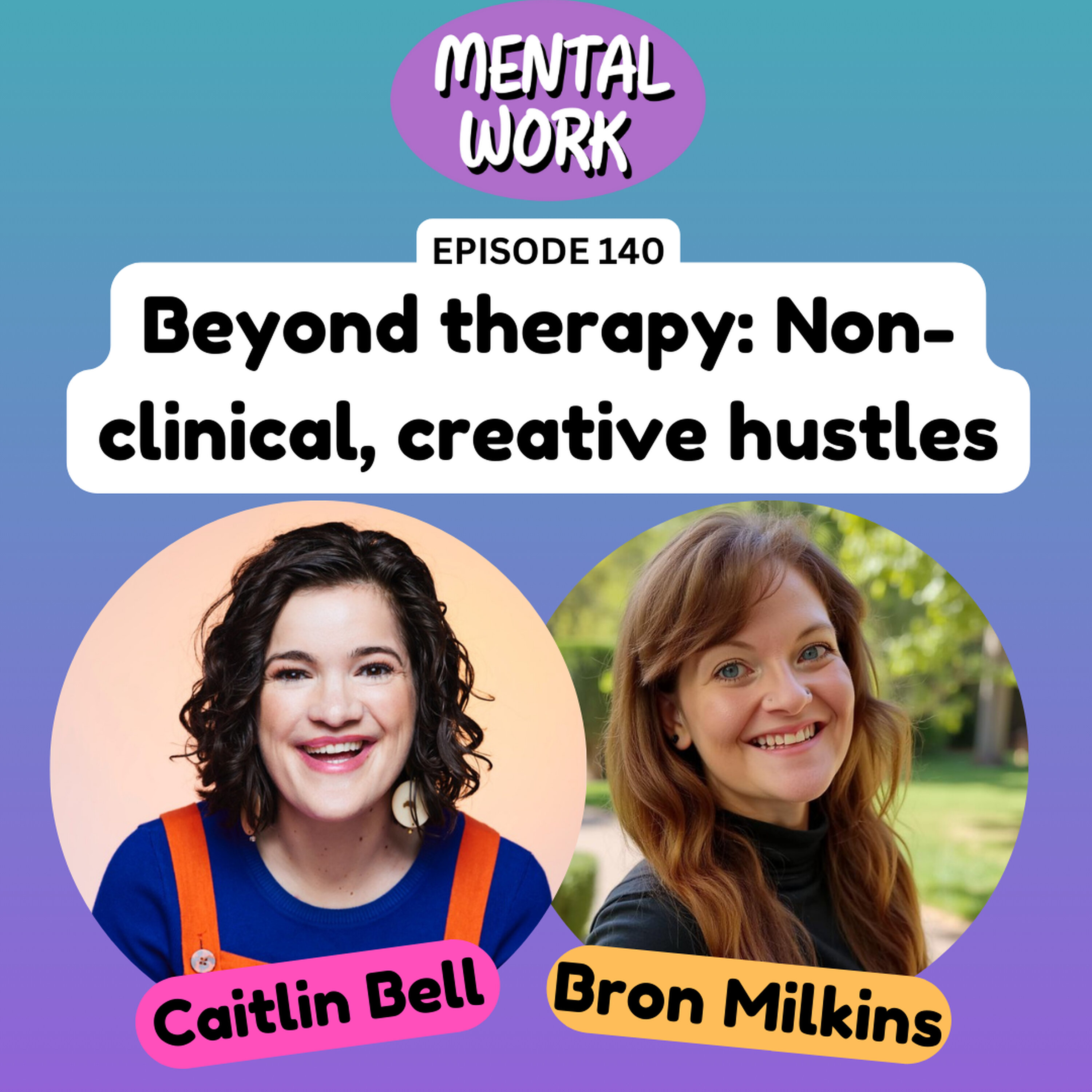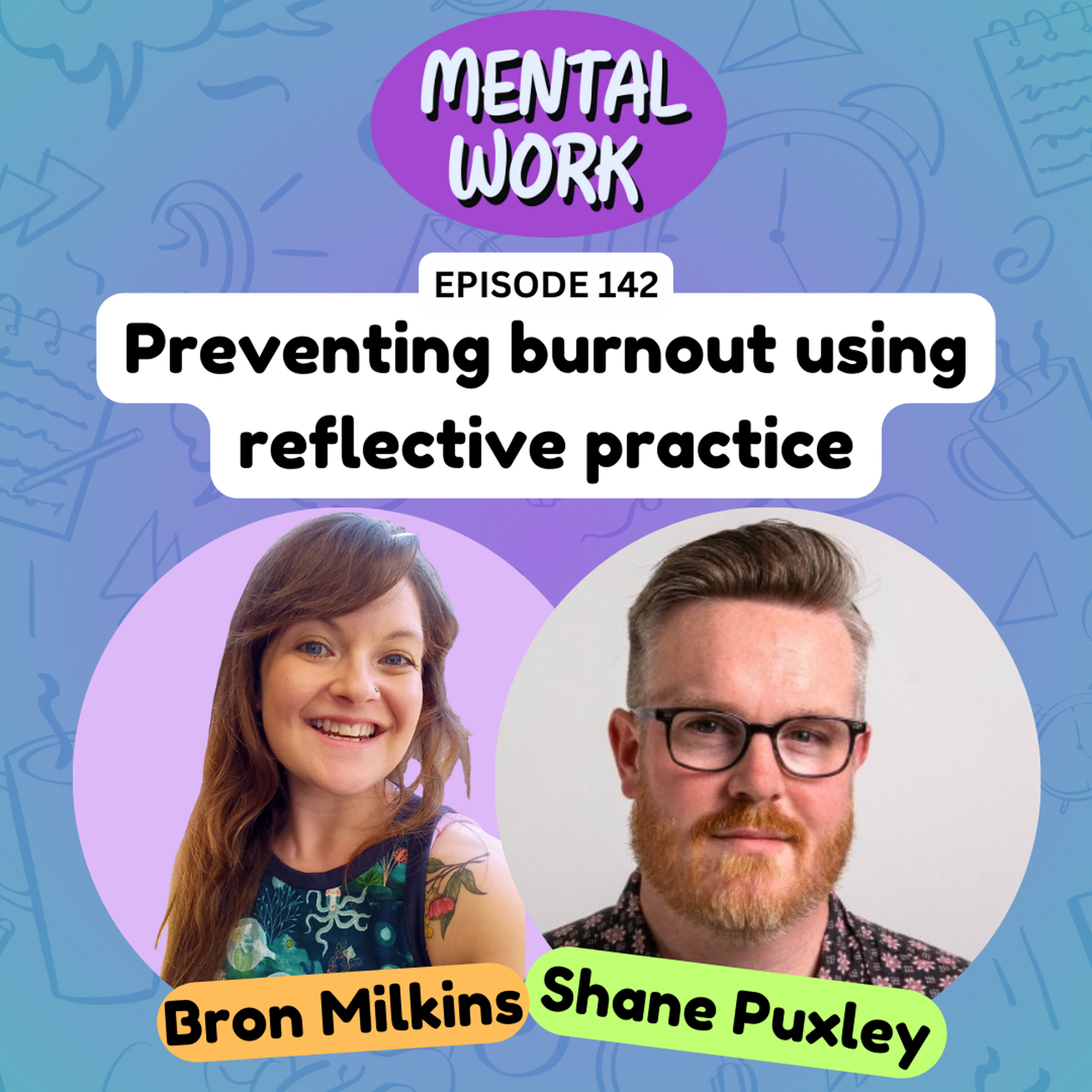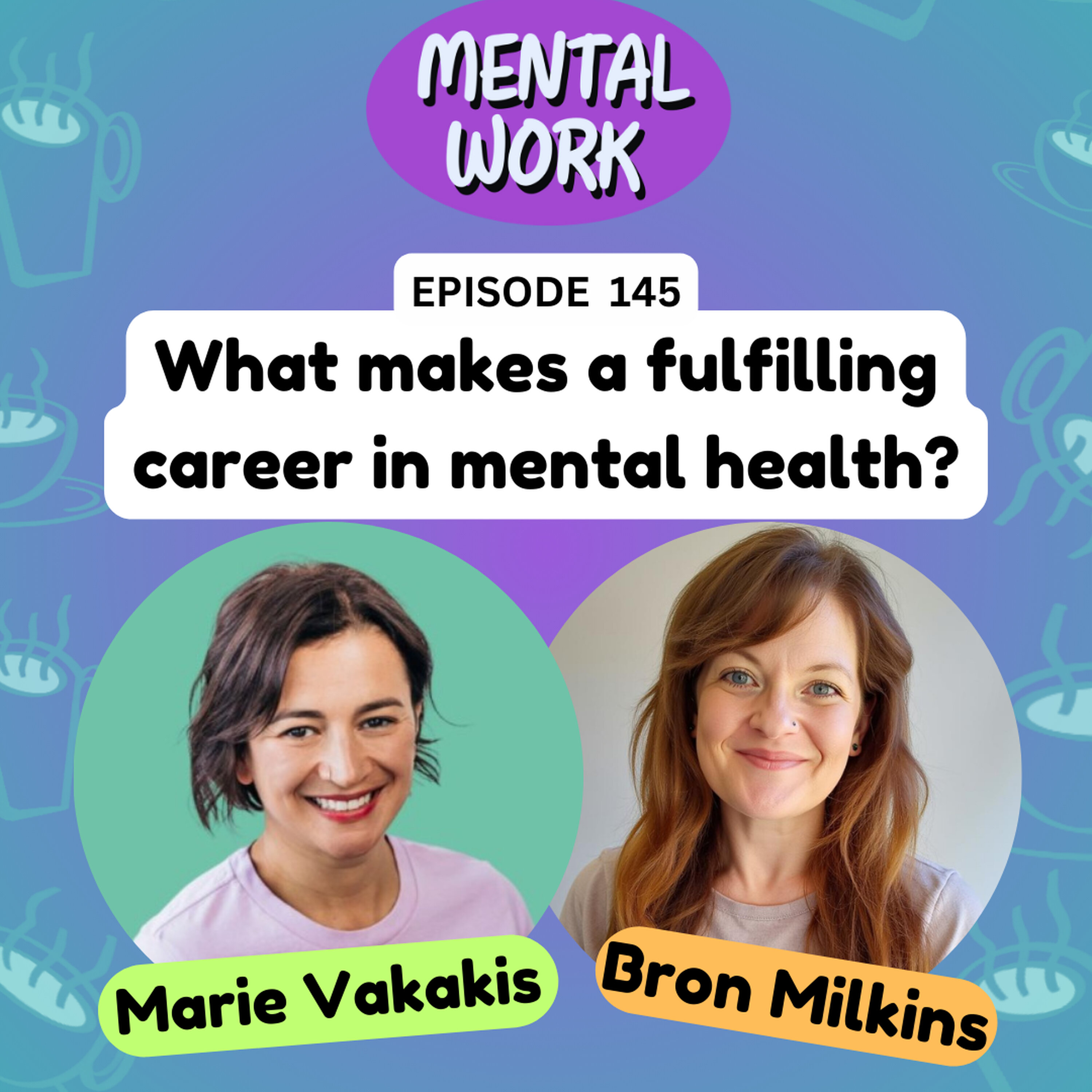Thinking about quitting?

Ever thought of calling it a day? Bron unpacks the dilemma of when you can't stop thinking about quitting working in mental health. She talks about 👉🏽 the stigma of quitting among mental health professionals 👉🏻 reasons why the urge to quit is understandable and (shock horror) normal 👉 options available to you 👉🏿 pros and cons of quitting your job vs leaving the profession 👉🏾 practical ways to reduce the urge to quit in the first place.
Mental Work is hosted by Dr Bronwyn Milkins, an early-career psychologist.
THE END BITS
Thanks so much for listening. Mental Work is the podcast for early-career mental health professionals that unpacks the everyday challenges they face, so they don’t have to go it alone.
Love the podcast? You can help keep it alive by joining our Patreon for $2 a month at patreon.com/mentalworkpodcast
Support the show - buy us a coffee! ☕ https://www.buymeacoffee.com/mentalwork
Website: https://www.MentalWorkPodcast.com
Credits
Host: Dr Bronwyn Milkins (Psychologist)
Producer: Michael English
Show art: Bronwyn Milkins
Music: Home
See omnystudio.com/listener for privacy information.
Have you ever been at the point where you just want to throw it all in? Where you look at your calendar and you internally groan at seeing yet another client. Today we will be talking about quitting, when you just want to leave it all.
There's actually a stigma around quitting. We see quitting as failure, but is sticking with a job that you hate year after year an idea of success? It's important to have these conversations because I want to give a voice to this feeling of when we are expected to continue to want to thrive in this field and grow, but we actually feel the exact opposite.
The first thing I want to let you know is that if you're thinking of quitting, you're not alone. Everyone in every job has thought of just dropping what they're doing, moving to the country and raising chickens. Maybe not that exactly, but they've definitely thought of quitting. So let's unpack what this urge to quit is all about in the mental health profession.
There are some signs that you want to quit. For me, I'll give you a few of my signs. And yes, I do have experiences of wanting to quit, normal emotion.
Dreading meeting clients and hoping they will cancel. That's a big one for me. Really having no satisfaction, waking up and wondering how you can call in sick. Can I call in sick today? What's my excuse going to be this time? And the classic looking for job positions on other websites. In between clients, you're scrolling, scrolling, hoping that the perfect job will come out. I'm sure there are other signs that you want to quit. Usually the thought is just in your mind.
And it' s like, I want to leave this job. I hate this job. I want to quit. But why, why do you actually want to quit? I had a little dig around the internet, read some Reddit threads, reflected on my own experience, and there are some common reasons why people want to quit.
One is you are feeling burnt out. You are exhausted. And when we are exhausted, we want to step back from the thing that we are doing as a way to cope with stress. Makes sense.
Another common reason to quit, and this one is unique to mental health professionals, is the documentation. So writing notes, writing reports, keeping up with Medicare requirements, keeping up with all the other requirements. That is huge.
Another one is isolation. For me, this is a huge one, particularly as I'm working in my own private practice. I just feel alone.
And then the next one is also a very common one. It's imposter syndrome, old mate imposter. So we're not feeling good enough. We're doubting our ability to conduct effective therapy. There can also be a mismatch between expectations and reality. So we're thinking, well, my clients aren't getting better. I thought that I would have this therapy prowess and then they would all get better a lot faster.
For me, my imposter syndrome comes up with, I'll literally be talking to a client and then there'll be this internal monologue behind the scenes going. "I'm feeling so stressed. I shouldn't be here taking care of others." And the other internal monologue is, "I can't help this person. Who do I even think I am?"
Another reason that we might want to quit is just our workplaces, bullshit. We hate our colleagues, we hate our boss, we hate our supervisor, and there are some clients that we also don't like too much too.
Another reason why we want to quit is that we've just gotten into the field. So as early career mental health professionals, we've kind of just started out and then we used to believe that therapy was the ideal career path for us, but then now that we're working in it, we're like, ah, this isn't actually for me.
Another reason is too much work. For me, I actually think this is probably one of the top reasons that early career mental health professionals want to quit because we really get thrown in the deep end with our first job out of study and in internships. We're getting all this new information, all these new presentations that we have never seen before.
We have incredibly unrealistic expectations placed on us that we need to see 25 to 30 clients a week. This amount often feels like you've been hit by a truck. It is way too much. We cannot do this. And even if we are the most competent people, it is just too much, and that's often because we don't get enough support. It's enough to make anyone want to quit. If you imagine a ladder, it's like we're being expected to jump to the top off the ladder instead of just taking it rung by rung.
Another reason to quit is that. In addition to too much work, not enough support, we feel like we're not being valued enough by the workplace, or we're not earning enough money, which is another way of workplaces communicating value to us.
There are lots of reasons why we want to quit and we just don't talk about it enough. We have these thoughts all the time, but we're all expected to be real jolly and just continue and want to thrive.
But what do we actually do when we're just noticing that urge to quit is rising. Sometimes it's hard to come up with solutions when you're struggling to keep your head above the water. Makes sense. In these situations, a break can be a good circuit breaker to help you take stock. I am literally on a week-long break right now and kind of dealing with this I want to quit feeling. If you can take a break, it is a privilege, but even if you can take a break of two days, one day, a few hours, try and drill in on why you want to quit. You'll be in a better position to come up with options.
There are a few main options. You can do nothing and hope it spontaneously improves. The other main option is you can do something and there's a spectrum of options here. There's quit, don't quit and everything in between. The nuclear option is to pack it all in and leave completely.
But there might be things that are okay with the profession so, don't throw out everything, but rather quit the status quo and search for changes that reduce that desire to quit. You could also quit the profession or just quit your workplace, your shitty job, and move into something else in the profession, so using your skillset in something else adjacent.
It can be helpful to find somebody else to talk about your urge to quit with. This happened to me yesterday. I was having some lunch with psychologists and somebody else voiced that they really wanted to quit. I was like, praise Jesus, I'm so relieved to actually hear that somebody else wants to quit.
It opens up the conversation and helps us actually unpack all the bullshit that we deal with day to day. When you don't have somebody else to talk to, again, reflect on your own reasons.
I'm going to share with you my reasons for wanting to quit. I've had this urge come up twice now. The first urge to quit came when I was working during my internship and I was seeing way too many clients, they were way too distressed and I wasn't getting nearly enough support. I really had to fight for support and even then it wasn't offered freely. I felt exhausted and of course I wanted to quit. It makes complete sense. So what I did then was I quit that job and I realized it was a shitty job. That's when I started my own private practice. So I was out of that situation of dealing with politics and just all the really difficult client presentations that I was not equipped to handle. I could actually focus on the presentations that I could handle.
Now that I'm in private practice, I've got the second wave of urge to quit. That's just come up again, I think, because I'm exhausted. I feel on the verge of burnout - my partner would say probably experiencing burnout - and feeling quite isolated.
Private practice is really isolating and you also come up with presentations that you don't know what to do with , and you're the one in the decision seat pulling the strings. What I have done with this urge to quit this time is that I was able to schedule a week off. I had pre planned that as part of Operation Prevent Burnout from last year that I would take more regular breaks. I scheduled a week off after six weeks so I'm currently in that week, thank goodness.
Now I'm reviewing, well, why is it that I want to quit? I've had a look at my day to day and I realized that spending time with my clients is one of the things that I enjoy most about my job. Actually, it is the thing that I enjoy most about my job. It is simply the amount of work that is really getting me down.
So what I did was go down from five clients a day to four clients a day, and it was so nice deleting those time slots from my calendar and being like, okay, I'm just going to do less. That really conflicted with my tendency towards perfectionism because in my head, it's like, you see five or six clients a day, four equals failure.
I think I just had to realize that this is what I need to survive in the long term. This is what I need for maintenance. Maybe I can see five in the future and then that can be my maintenance, but why have these unrealistic expectations of me now? So I'm feeling much better about that.
I've also tried to reduce my work outside of work. Right now, I don't have the capacity to do anything outside of work. So I'm getting my notes done at work. I'm doing my reports on my work days and outside of work, I'm trying to do nothing, which is stark contrast to before. I think I was just working 24/7.
I also indulged in my fantasies to do other things other than therapy. I was looking up massage therapy courses, personal training courses, nutrition courses. I even looked up financial counseling and I have zero, zero interest in financial counseling. I don't even know what I was thinking.
But I've indulged myself and actually look seriously at each of these options. I don't think I feel like doing any of the above right now, now that I've looked at it, but it was fun to indulge and dream and bring myself back to therapy.
The final thing that I've done in therapy is I've also returned to my roots. So for me, I love learning and it's been really fortunate that I have some professional development training coming up and then I can indulge myself in actually learning about something.
Those are just my personal experiences with this urge to quit feeling. I don't feel like I'm going to quit right now, although, I don't know.
I'm still kind of like tiptoeing around it, but if I do quit, it would probably be moving into something adjacent and not quitting therapy completely. You might find something different. In the end, you have to do what's right for you. Don't be beholden to your supervisors or even your clients if you feel like this is not working for you.
Don't stay in the field just because you should. Stay if you want to. Again, some people's idea of success might be grinding and just keeping going, but is that your idea of success? Maybe your idea of success is doing what's aligned with where you want to go and who you want to be and how you want to act in this world.
I just want to address a few things that came up in my readings that I also want to pass on to you. A few recommendations would be think about why you started doing this in the first place. Can you still achieve your ambition without doing therapy? For example, if you wanted to start doing therapy in the first place because you wanted a better understanding of mental health or you wanted to help people, could you do something adjacent to that? Can you still help people by actually I guess doing mental health education. Maybe take the first step towards that original goal.
Another thing, you might be thinking of quitting, but you're worried about your clients. I have learned that you're allowed to be human and take care of yourself. Taking a month off is fine. You're allowed to take care of yourself as a human. Being a therapist doesn't and shouldn't always supersede that, but we are bad about that in our industry. We're like, no, no, they come first, but your health and wellbeing come first. Remember that you're not the first person to ever consider quitting. People move, people quit, people retire. You won't be the first or the last. Whatever move you make, do it with kindness and respect and you'll be okay.
When I faced my imposter syndrome, I had to realize that clients will not be making improvements straight away. Be real about it. Be real about change. Change is a hard process. But whenever they do make progress, this will be a massive positive reinforcer and allow yourself to be open to that. Don't diminish it and be like, "Oh, I didn't do anything". If a client gives you a compliment, then burn that into your brain and remember that.
There have also been times where I've doubted my ability to do things. When I say there have been times, I mean, it happens every day. I'm with a client and I'm like, can I help this person? Am I doing anything that's actually good?
I've found that doing intensive training in one of the modalities that I'm practicing in can help me to understand that I actually do know things and it can provide some cool new approaches and techniques. So the best case scenario is that I'm like, Oh, great. I know everything here, feeling good about myself and I've come away with something new and then the worst case scenario is that I just come away with like new techniques that I can apply straight away.
Another recommendation that I've come across when you are noticing that urge to quit rising is to help yourself by putting a little bit more time and energy into doing your documentation on the day. I know myself that I feel so much better when I am up to date with my notes and I can spend just an extra 10 minutes at the end of the day making sure that I'm up to date on that. Then I don't have to stress about catching up and the work doesn't pile on top of each other.
Another thing is saying to ourselves, "doing our job is hard", it is hard going and it is okay to feel like this. We're allowed to take breaks, we're allowed to feel like we want to quit, even if we're just starting out in this profession. We don't have to be fully consistent beings and be like, yes, 100% I'm loving this.
I think with bringing passion back to our work, we need that space to just take a break, decompress, de-stress, and then it is allowing ourselves to feel the emotions, allowing ourselves to dream and look up being a remedial massage therapist, if you're in my shoes or something else. Maybe you want to do dog sitting, whatever it is that you want to do, have a dream about it, go have a look. There's no harm in exploring.
I'm sure there's lots more to unpack with this urge to quit. I've heard other experiences of people, that just realize that being a mental health professional is not for them. It's not what they envisaged it to be. Then they've gone into other careers and they've had a great time. Certainly, they feel like it's a better fit for them.
Then I've read stories about other people who, like myself, have realized that, no, I want to stay in this profession, but I definitely need to challenge the status quo and make it work for me.
Whatever it is you decide to do, again, I would just leave you with the message, do what's right for you. Don't be beholden to anyone else because it's not worth setting yourself on fire to keep other people warm.




